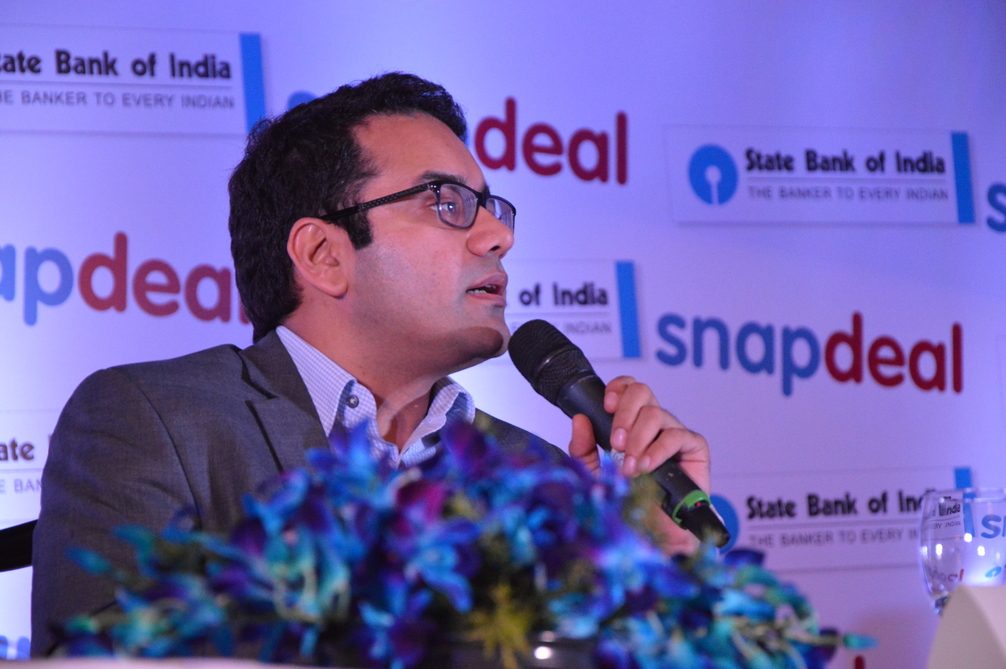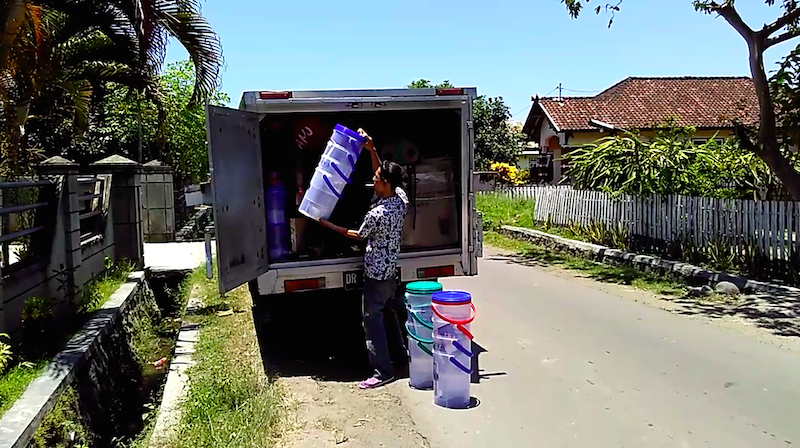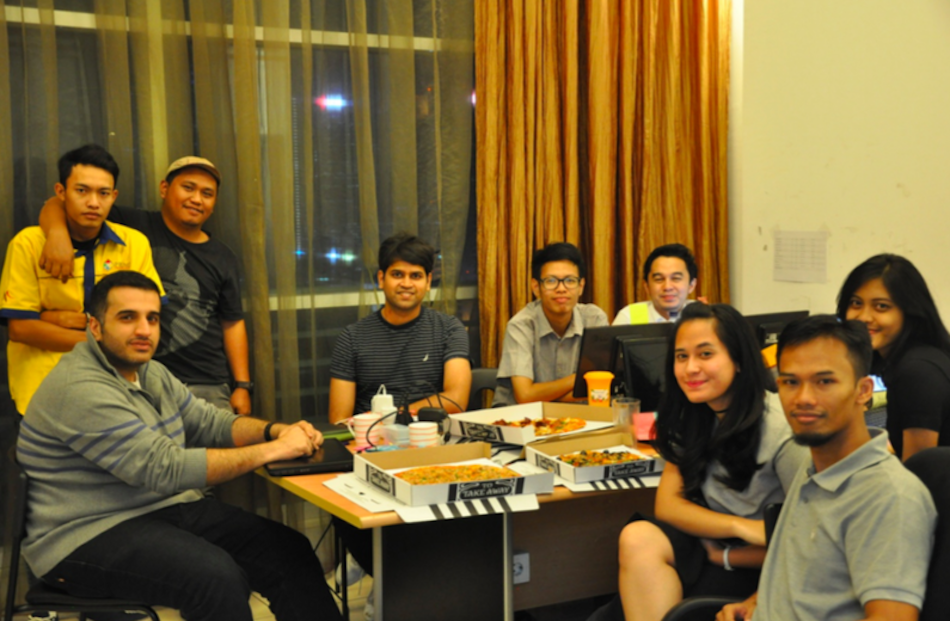![]()
Deni Sugiarto steers the minivan down a deserted road in western Sumbawa toward the regency’s capital, Sumbawa Besar. Equipment rattles around in the trunk as we fly past nondescript towns, separated by stretches of arid hills, fields of corn, onions, and rice, and the occasional herd of grazing goats and wild ponies.
Sumbawa is one in a long chain of roughly 17,000 islands that make up the Indonesian archipelago. Even by Indonesian standards, it’s off the beaten track, but Deni has come to know this region well.
![IndonesiaWestNusaTenggara]()
The location of Lombok and Sumbawa in the Indonesian archipelago. Image credit: Wikipedia.
A few days ago, he made the same journey, from Poto Tano, the harbor, to the capital and the villages beyond, on a motorbike. Based in neighboring Lombok, he’s been crossing the narrow sea between both islands regularly in the past months. Sometimes he’s alone, or, like this time, with another colleague and a reporter.
Kopernik, the social enterprise Deni works for, is in expansion mode. It started building its program in Lombok 3 years ago. Now Deni’s task is to push into new territory.
The 46 percent
Kopernik is something of a hardware startup for basic appliances.
It has a range of durable, easy-to-use tools in its inventory: solar lamps, water filters, biomass stoves. It sources them from different suppliers and distributes them in remote villages of Indonesia through a network of resellers who earn a commission for each item they sell.
![Sumbawa-truck-unloading-v2]()
Deni and his colleague unload a number of water filter units from the truck. In Sumbawa, this is Kopernik’s best-selling item. Photo credit: Tech in Asia.
Let’s say you live in Sumbawa Besar and think you can sell 10 water filters to people in the neighborhood in the coming weeks. Deni will deliver the product to you, and on his next visit, he’ll collect part of the money while you get to keep the rest.
Kopernik has become expert at working in the far-flung, sparsely populated parts of Indonesia.
The idea is to offer entrepreneurial islanders an opportunity to make extra income.
Kopernik typically works with women. Deni’s first task is to identify potential sellers and convince them to join the program. As the group of sellers grows, he needs to figure out how to distribute resources, improve the product range and onboarding process, and keep sellers happy.
It’s an iterative process not unlike building an app. But if your end customers are primarily farmers and fishers, the opportunity you’re looking at isn’t a billion-dollar business. Kopernik sustains itself with a mix of profit-generating activities, such as its consulting arm, and grants and donations.
See: Kopernik brings low-cost tech to remote parts of Indonesia
It has become expert at working in the far-flung, sparsely populated parts of the country. Urbanization may be changing Indonesia, but 46 percent of the population remains scattered in what the World Bank considers rural areas.
How the social enterprise expands into new territories and introduces traditionally-minded communities to new habits holds valuable lessons for all entrepreneurs.
Lesson 1: Study the intricacies of your new market
Official data tells Deni about demographic distribution, ethnicities, languages, and income levels of the Sumbawa’s population. But this information is abstract and doesn’t explain how people make decisions.
He’s come to view each new territory as a microcosm defined by its geography, economy, politics, and the habits and beliefs of its people. In his exploration of Sumbawa, three observations turned out to be particularly relevant. Knowing the types of challenges he would encounter helped Deni find workarounds.
Seasonal habits
The island’s largely farming-based economy means people make money seasonally. Sometimes there’s a good harvest, other times, not so much. People also prioritize spending on festivals and rituals, so disposable cash for other purposes is rare.
Understanding the island’s cycles helps Deni decide when to schedule trips and new initiatives. It took time to learn. “I arrived in the wrong season,” he remembers. During harvest season, no one had money, nor the time, to get involved with Kopernik.
Now he knows when to anticipate low demand and he’s learned to distribute supplies accordingly.
![]()
A Sumbawa fisherman and his wife, with one of the small solar lights in Kopernik’s product portfolio. Photo credit: Tech in Asia.
Influence of the mine
The majority of Sumbawa’s inhabitants subsist on farming, fishing, and odd jobs. What sets it apart from neighboring islands is that its hills are particularly rich in minerals like copper and gold. The presence of mining companies in some areas has had a massive impact on the island’s social fabric.
To some, employment at the mine has brought stability, even prosperity. The mine’s corporate social responsibility (CSR) programs have been generous at times, helping with healthcare and education. However, these programs are run at the whim of the mine’s leadership. If it decides to cut the budget, it’s over.
In Deni’s eyes, the CSR initiatives have been more hurtful than helpful. “People expect things for free now,” he explains. It’s at odds with what he tries to achieve: encourage individuals to make smart purchase decisions or take on responsibility by joining Kopernik as product sellers. He now has to work against the expectation that products should be just handed out for free.
Not off-grid
The presence of mining in Sumbawa also means that in terms of infrastructure, the island is better off than some of its neighbors. Streets are relatively well kept, and most of the island is on the electricity grid (though temporary blackouts are frequent).
In other parts of Indonesia, Kopernik’s solar lamps are particularly relevant, but Deni knew he’d sell less of them in Sumbawa. His flagship product here is the water filter.
Lesson 2: Personal networks work best
Deni had several ideas on how to recruit sellers in Sumbawa. One of them was to work with the local health authority. Women who work in public health centers around the island could sell Kopernik’s products to the people they come in contact with and make some money on the side.
Kopernik’s water filter, which makes tap water and water from rivers and ponds safe to drink, fit nicely into the region’s public health agenda. Contaminated drinking water is a problem that leads to many illnesses.
But setting up meetings with these groups turned out to be time-consuming. If a meeting fell through during one of Deni’s visits, it would be postponed for weeks.
It was easier for Deni to begin with people he knew through his personal network. A friend in Lombok knew families in Sumbawa, and they helped recruit additional sellers. With some success cases to boast of, Deni later approached the local government to propose a cooperation with the public healthcare system.
Lesson 3: Let go of assumptions and (some) ideals
Kopernik’s original ambition was to empower vulnerable women, like single mothers, by signing them on as sellers. Besides making some extra income, they would elevate their social status in the community.
This didn’t work out as expected. Women who came from a disadvantaged position had difficulties convincing others to buy from them. In one case, for example, a middle-aged unmarried woman had to return the products she received from Kopernik, not having sold enough items.
![Sumbawa-woman-Ibu-Dewi]()
At 37-year old and unmarried, Dewi has a difficult social standing in her village. She wasn’t able to sell any products and decided to leave the program. Photo credit: Tech in Asia.
“Because she’s not married, it’s difficult for her to go from house to house,” Deni explained. In Sumbawa’s traditional society, this behavior was considered inappropriate by the other villagers.
Over time, Deni had to concede that the best resellers were women coming from better-off households, with husbands who supported their efforts. They had the social clout to convince others of the benefits of the new products.
Lesson 4: Repetition and rituals
Deni learned that he had to invest time into building trust with the women in his reseller network.
He developed rituals, like a regular visiting schedule. He drops by the women’s homes one by one each time he is on the island and chats with their families.
The habit-forming exercise ends with both parties filling out a paper form to track how many items have been sold, how much money is owed, and which products need to be restocked on Deni’s next visit.
![Sumbawa-house-visit]()
The Kopernik van arrives in front of the house of one of the women in its network. Photo credit: Tech in Asia.
He later transfers these figures onto a spreadsheet. The paper-based interaction is a must, Deni explains. The ritual of inking in the numbers, as well as archiving a physical copy of each form, helps build commitment. He couldn’t achieve this if the figures were only tapped into an app on a computer or smartphone.
Lesson 5: Payment in installments is a must
As mentioned earlier, incomes in Sumbawa fluctuate with the seasons.
Deni has learned to accommodate flexible payment schedules. Payment in installments is the norm. Buyers can take the product home immediately or pay in small, monthly installments if necessary.
This isn’t a problem for sellers because they don’t front the money for the product.
To Kopernik, waiting for months to cover their expenses is a necessary step for now. Once distribution networks are more established and there’s higher demand for Kopernik’s products, it might introduce commission-based contracts with some of its sellers.
Lesson 6: TV shapes expectations
Even women with a high social status find it difficult to introduce new products and convince others of its benefits.
One of the difficulties described by a woman selling Kopernik’s water filter is that buyers think it looks cheap, or not as sturdy as a similar one by a well-known brand that’s frequently advertised on TV. Kopernik’s filter is much more affordable – but that doesn’t automatically make it more desirable.
![]()
TV plays a big role in shaping people’s expectations about products and their perceived quality. Deni trained the sellers to counter those arguments by explaining how the different components of the filter were made, and how the product’s quality has been approved by local authorities.
Lesson 7: Gadgets don’t matter that much (yet)
Kopernik’s work occurs largely offline and involves copious amounts of paper. People on Sumbawa do own phones – some even have top-notch smartphones.
They’re used for communicating with friends and family, but do not hold a place in people’s business transactions, where writing things out on paper is a way of building trust.
![Sumbawa-girl-tablet]()
A girl engrossed in the game she’s playing on the family’s tablet. Photo credit: Tech in Asia.
When I asked some women about their smartphone habits, they didn’t recognize the names of popular local ecommerce companies, such as Tokopedia and Bukalapak. To them, online shopping was synonymous to buying something based on a post in a chat group. Most women said they had heard of people selling and buying this way, but were wary of doing so themselves.
This could change in the span of a few years as the spending power shifts to the younger generation. Even in lower-middle class families, there’s surprising mobility. Children leave the island to study and work elsewhere, returning home for the holidays with new habits they picked up in the city.
This post How to scale your business across Indonesia’s remote islands appeared first on Tech in Asia.

















































